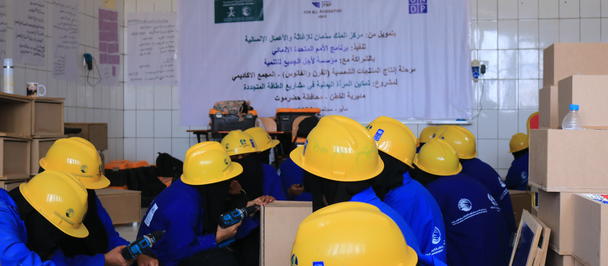Planting seeds of change: regenerative farming in Eastern Ghouta
April 23, 2025

Every morning, as the first rays of sunlight break over the village of Bala in Eastern Ghouta, Rural Damascus, 50-year-old Hayat rises to tend the small plot of land beside her home. For Hayat, this piece of land is more than just soil and seeds—it is her family’s livelihood. As a mother of eight and a caregiver to her husband, whose disability has left him unable to work, she has long relied on this land to sustain them.
One morning, while resting after watering her crops, Hayat heard neighbouring farmers discussing a new initiative: the “Eco Farmers” project by the United Nations Development Programme (UNDP). Designed to promote sustainable agricultural practices in the face of climate change and resource scarcity, the project immediately resonated with her.
“I felt like the project was made for me,” Hayat said. “My heart was racing as I registered. I just knew I had to be one of the farmers selected for the project.”
Soon after, she received the call she had been waiting for—she had been accepted into the programme. Hayat eagerly joined a series of trainings on regenerative agriculture, learning about companion crops, organic plant extracts, vermiculture, composting, intensive planting basins, and more.
“I was like a child learning the alphabet,” she recalled. “Every session was a treasure. We were learning and applying what we learned practically in the nearby land and in our land.”
Hayat is one of 100 farmers in Rural Damascus transforming agriculture through the regenerative farming project, implemented by UNDP in Syria with support from the Government of Japan. The initiative is equipping farmers with tools and knowledge to adapt to climate change, promote sustainability, and optimize limited natural resources.

©UNDP Syria – Tahseen Saor
Hayat not only absorbed the knowledge but brought it home—literally. Her daughter, a university student studying agricultural engineering, had been struggling to raise vermi-compost worms as part of her project. After a hands-on training in worm farming, Hayat returned home excited and determined. Together, they revived the experiment and succeeded in cultivating nearly 100 healthy worms in a short time, even preparing their first batch of organic vermi-tea.

©UNDP Syria – Tahseen Saor
“Our trial finally worked,” Hayat smiled. “The vermi-tea was so effective—it felt like magic.”
But Hayat’s journey did not stop there. She implemented intensive planting basins that delivered impressive, unconventional results. Weeds were no longer a nuisance—they became compost gold. She learned to recycle all agricultural waste, turning what was once burned into valuable organic input.
“When my neighbours saw the results, they asked for help,” Hayat shared. “Now, my daughter and I visit their farms to teach them, support them, even supervise their planting.”
Today, Hayat has even managed to buy a small agricultural tiller, easing the physical burden of ploughing her land. Her story is proof that when we empower individuals—especially women—through sustainable solutions, we grow more than crops. We cultivate resilience, dignity, and plant the seeds of lasting change..

 Locations
Locations



